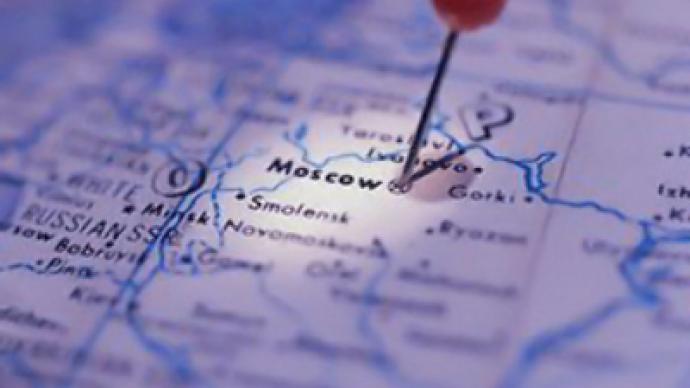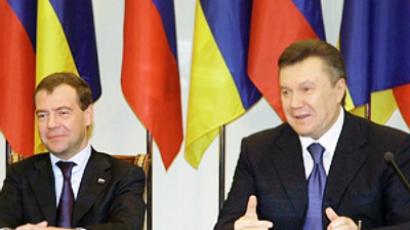Europe’s security architecture needs "a Russian support column"

The prospect for sustainable relations between Russia and NATO will depend on how the Alliance’s new strategy gives due consideration to Russian concerns over European security.
Russian Deputy Foreign Minister Sergey Ryabkov, US Assistant Secretary of State Philip Gordon and US ambassador to NATO Ivo Daalder met in Moscow today to discuss preparations for next month's NATO-Russia summit.
"The meeting focused on the work of the NATO-Russia Council, primarily the preparations for the forthcoming summit in Lisbon," the Russian Foreign Ministry said.
The officials also discussed pressing issues surrounding US-Russian political dialog, including missile defense, the CFE (Conventional Armed Forces in Europe) treaty and joint assessment of major security risks and challenges.
President Medvedev accepted his invitation to attend the NATO meeting in Lisbon (Nov. 19-20) during last week’s “troika” summit in the French seaside town of Deauville. There, the Russian leader discussed European security with German Chancellor Angela Merkel and French President Nicolas Sarkozy.
Although many issues were touched upon in Deauville, Medvedev’s proposal for a new European Security Pact, which he first floated in April 2009, was greeted with “considerable interest,” according to one senior Russian diplomat who spoke on the sidelines of the summit.
“There are certain elements of NATO strategy, including the present war in Afghanistan, that are distressing particular [NATO] members,” the Russian diplomat said on condition of anonymity. “The Alliance was initially designed to protect Europe from immediate dangers, but now some see [the military bloc] as drifting away from that original concept.”
A European security architecture needs a Russian support column," he added. "Otherwise, the structure is fundamentally flawed."
Meanwhile, Kommersant, the Russian business daily, reported Wednesday that Foreign MinisterSergey Lavrov handed a draft agreement to NATO demanding a ban on "significant military forces'' in states that joined the Alliance since the breakup of the Soviet Union in 1991. It quotes an unnamed NATO official as suggesting the term appears too vague.
NATO drift
One example of NATO drift is the ongoing war in Afghanistan. European capitals increasingly view this adventure as a prodigious waste of funds (the war is costing $10 billion dollars per month), not to mention lives (with two months still left till the new year, 2010 has already become the deadliest year on record for coalition forces with 602 deaths). For comprehensive fatality statistics in Afghanistan, click here.
NATO assumed command of the International Security Assistance Force (ISAF) in Afghanistan in 2003. Since then, the Alliance has expanded the reach of its mission, originally centered on Kabul, to cover all of Afghanistan’s territory.
Taliban forces have staged a dramatic comeback over the last year, which led to a surge of troop numbers. The size of the ISAF has now exploded from the original 5,000 to around 140,000 troops representing some 47 countries, including all 28 NATO member states. It should be noted that this is the same number of troops that the Soviet Union had stationed in Afghanistan.
With Russia’s own bitter memories of war in Afghanistan still fresh, it is understandable why Moscow is concerned about what direction the Alliance’s strategy will take in the future. Will it work to maintain European security – as well as prevent heroin shipments from getting past the Afghan border, a worrisome development that is taking a grave toll across Europe and Russia. Or will it continue on its wild goose chase in the hunt for Osama bin Laden in the porous mountain ranges and passes between Afghanistan and Pakistan?
There are other incidences of NATO veering out of control, at least from Moscow’s perspective, that continue to give Russian leaders tremendous pause. NATO’s aerial bombardment of Yugoslavia (March 24, 1999 to June 11, 1999), for example, over the question of Kosovo independence marked an all-time post-Cold War low in Russian-Western relations that should never be repeated.
More recently, the possibility of NATO membership being granted to borderline countries that have presented difficulties for Russia in the past, including Georgia and Ukraine, is also cause for concern.
"In our relations with NATO much will depend on what form the Alliance's strategy, currently under development, will take," Lavrov said at a news conference in Moscow on Tuesday. "How the strategy will spell out NATO's position on international law, on the UN Charter, primarily in the context of use of force, will be of key importance for us," Interfax quoted the foreign minister as saying.
Lavrov then added that Moscow is talking with all of NATO’s capital cities over the question of the Alliance’s strategic direction.
“It is a key issue and we are engaged in substantive talks on it with our partners in Brussels and in all of NATO's capital cities."
"We understand NATO's role, as well as the role it can play in tackling problems common for Europe and the world, connected with terror threats, drug addiction, organized crime, the fight against pirates and many other challenges which are common for all of us and which demand the use of military potentials," Lavrov said.
While it is certainly too early to talk about the “death of NATO,” there are some US commentators who view Russia’s increased influence in Europe as a means of keeping NATO “at a distance.”
This week, The New York Times published a semi-hysterical article entitled, “Will the US Lose Europe to Russia?” in which columnist John Vinocur waxes sentimentally about the good old days of the Alliance when the United States “decided what was deviation from doctrine, and that decision was pretty much law.”
Handwringing over the trilateral “aftermath” in Deauxville, Vinocur fretted over the possibility that Germany, France and Russia will make “such three-cornered get-togethers on international foreign policy and security matters routine,” which would look suspiciously like “an effort to deal with European security concerns in a manner that keeps NATO, at least in part, at a distance.”
Vinocur failed to mention, however, that Washington basically ignored Brussels’ quiet concerns over the decision to build a missile defense system – altered under Obama, but still a major concern for Moscow – in Poland and the Czech Republic. This move has only served to turn up the temperature between Russia and the European Union, while doing little to thwart any of the perceived threats.
Although Merkel and Sarkozy assured Medvedev that Russia would be able to participate in the controversial system, it will ultimately be Washington that determines the degree of that participation. Will Russian officials be stationed full-time at the facility (which, remember, is supposed to protect Europe) alongside American and European officials, or will the Russians only be permitted an occasional inspection of the facility?
Moreover, the very question of Russian participation in the system could aggravate relations between Western Europe and Eastern Europe, already touchy over questions of Brussels’ influence. Although Washington regularly accuses Moscow of attempting to drive a wedge between Europe, it was none other than Donald Rumsfeld, the former US Secretary of Defense, who rhetorically and not a little provocatively carved up Europe between the “New” and the “Old.”
"Germany has been a problem and France has been a problem," Rumsfeld famously told Washington's foreign press corps in January 2003, as the Bush administration was attempting to make a case for war against Iraq.
"But you look at vast numbers of other countries in Europe, they're not with France and Germany… they're with the US.
"You're thinking of Europe as Germany and France. I don't," he said. "I think that's old Europe."
In conclusion, the type of security architecture that is finally chosen for the European landmass could spell the difference between a rekindled cold war, or a lasting relationship built on the solid ground of trust between Russia and the western Alliance.
Given Russia’s tremendous historical contribution to the defense of Europe, to say nothing about its future potential, there can be no question of including Russia into the European security architecture. Otherwise, NATO will simply be attempting to hold up a roof with just one column.
It doesn’t require an architect to prove that such a design will never work.













